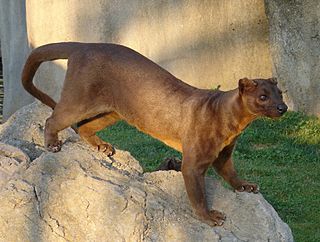
The family Vangidae comprises a group of often shrike-like medium-sized birds distributed from Asia to Africa, including the vangas of Madagascar to which the family owes its name. Many species in this family were previously classified elsewhere in other families. Recent molecular techniques made it possible to assign these species to Vangidae, thereby solving several taxonomic enigmas. The family contains 40 species divided into 21 genera.

The fossa is a slender, long-tailed, cat-like mammal that is endemic to Madagascar. It is a member of the carnivoran family Eupleridae.

Mantella are a prominent genus of aposematic frogs in the family Mantellidae, endemic to the island of Madagascar. Members of Mantella are diurnal and terrestrial, with bright aposematic coloration or cryptic markings.

Sanzinia madagascariensis, also known as the Madagascar tree boa or Malagasy tree boa, is a boa species endemic to the island of Madagascar. It was once considered conspecific with the Nosy Komba ground boa. Like all other boas, it is non-venomous.

Acrantophis madagascariensis is a species of boid snake in the subfamily Sanziniinae that is endemic to the island of Madagascar. Its common names include the Madagascar ground boa and Malagasy ground boa.

The Anjajavy's Protected Area is located on a peninsula of the town of Antonibe, in the district of Analalava and in the north-west region of Madagascar. It is part of the Sofia region of the independent province of Mahajanga and its position is between 47°13’ at 44°22’ of longitude east and 14°58 at 15°07’ of latitude south..
Xenotyphlops is a genus of snakes, the only genus of the family Xenotyphlopidae, comprising two species found only in Madagascar. These snakes are also known as the Malagasy blind snake.

The narrow-striped mongoose is a member of the family Eupleridae endemic to Madagascar. It inhabits the western Madagascar succulent woodlands and northern Madagascar spiny thickets in western and southwestern Madagascar, where it lives from sea level to about 125 m (410 ft) between the Tsiribihina and Mangoky rivers. In Malagasy it is called bokiboky. It is the only species in genus Mungotictis.

Cryptoprocta spelea, also known as the giant fossa, is an extinct species of carnivore from Madagascar in the family Eupleridae which is most closely related to the mongooses and includes all Malagasy carnivorans.

The large-eared tenrec is a species of mammal in the family Tenrecidae. It is the only species in the monotypic genus Geogale, and the only member of the subfamily Geogalinae. It is endemic to Madagascar where its natural habitats are subtropical or tropical dry forests and shrubland. It is threatened by habitat loss, but to a lesser extent than was previously thought and is listed by the IUCN as being of "Least Concern".

The Pseudoxyrhophiidae is a family of elapoid snakes, found mostly in Madagascar. They were formerly placed as a subfamily of the Lamprophiidae, but have been more recently identified as a distinct family.

Oplurus cuvieri, commonly known as the collared iguana, the collared iguanid lizard, Cuvier's Madagascar skink, Cuvier's Madagascar swift, and the Madagascan collared iguana, is a species of arboreal lizard in the family Opluridae. The species is native to Madagascar and the island of Grande Comore, Comoros. There are two recognized subspecies. O. cuvieri is the largest of six species in the genus Oplurus.
Caryospora is a genus of parasitic protozoa in the phylum Apicomplexa. The species in this genus infect birds and reptiles with the majority of described species infecting snakes. It is the third largest genus in the family Eimeriidae.

Liophidium is a genus of snakes in the family Pseudoxyrhophiidae. The genus contains ten species, nine of which are endemic to the island of Madagascar and one to the island of Mayotte. All species of Liophidium are harmless to humans.

Lycodryas is a genus of snakes in the family Pseudoxyrhophiidae. The genus contains nine species, seven of which are endemic to the island of Madagascar, and two to the Comoros Islands. Its sister taxon is Phisalixella. All of the species are harmless to humans.

Compsophis is a genus of harmless snakes in the family Pseudoxyrhophiidae. The genus is found only on the island of Madagascar.
Madagascarophis lolo is a species of snake endemic to Madagascar. It is colloquially referred to as the ghost snake due to its strikingly pale coloration. It was initially found inside a lime rock formation in 2016.

Madagascarophis colubrinus, commonly known as a Madagascan Cat-eyed Snake, is a species of snake of the family Pseudoxyrhophiidae.

Charles Antoine Domergue was a French naturalist, ornithologist, herpetologist, spelunker and geologist who spent much of his life in Madagascar. He also dealt with the effects of pollution.
Brygophis is a genus of snake in the family Pseudoxyrhophiidae. The genus is monotypic, containing the sole species Brygophis coulangesi, which is endemic to Madagascar.


















